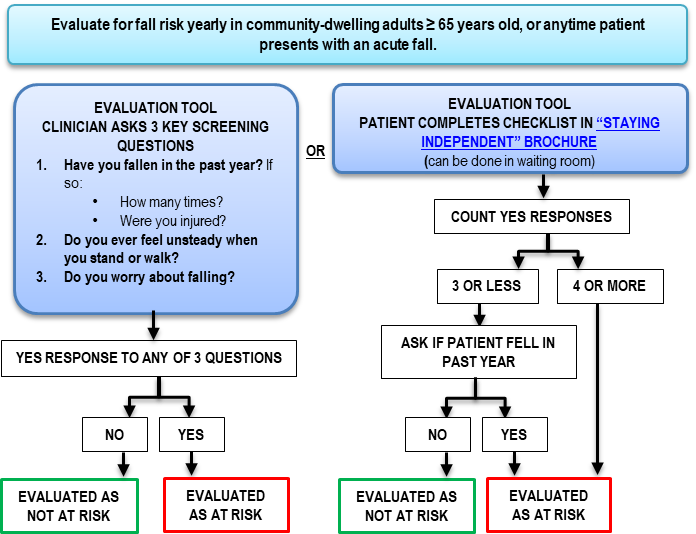Getting The Dementia Fall Risk To Work
Getting The Dementia Fall Risk To Work
Blog Article
All about Dementia Fall Risk
Table of ContentsGetting The Dementia Fall Risk To WorkWhat Does Dementia Fall Risk Mean?The smart Trick of Dementia Fall Risk That Nobody is DiscussingHow Dementia Fall Risk can Save You Time, Stress, and Money.9 Easy Facts About Dementia Fall Risk Described
In the community, insufficient street lights or unprotected creeks and landfills may also create crashes. Loss Risk Assessment Tool (FRAT) is a 4-item falls-risk testing device for sub-acute and domestic care. The FRAT has three areas: drop danger condition, danger aspect checklist, and activity plan. A Loss Danger Standing consists of data about background of recent falls, medicines, emotional and cognitive status of the individual.If the individual ratings on a threat factor, the equivalent number of points are counted to the client's fall threat score in the box to the far. If a client's fall danger score amounts to five or greater, the individual goes to high risk for drops. If the patient ratings only 4 factors or lower, they are still at some threat of dropping, and the registered nurse needs to utilize their finest medical evaluation to manage all autumn threat aspects as component of a holistic treatment strategy.
These common approaches, in basic, help create a safe atmosphere that reduces unintended drops and marks core preventive steps for all individuals. Signs are crucial for people at danger for falls.
Dementia Fall Risk Things To Know Before You Buy
For instance, wristbands should include the client's last and given name, date of birth, and NHS number in the UK. Details need to be printed/written in black against a white history. Only red color ought to be used to indicate special person standing. These suggestions are constant with current developments in client recognition (Sevdalis et al., 2009).
Items that are also far might call for the client to get to out or ambulate unnecessarily and can potentially be a hazard or contribute to drops. Helps avoid the individual from going out of bed with no assistance. Registered nurses react to fallers' phone call lights quicker than they do to lights started by non-fallers.
Aesthetic problems can substantially cause falls. Keeping the beds closer to the flooring reduces the danger of drops and serious injury. Placing the cushion on the floor significantly reduces fall danger in some healthcare settings.
Fascination About Dementia Fall Risk
Clients that are tall and with weak leg muscular tissues that try to remain on the bed from a standing setting are likely to fall onto the bed since it's too low for view it them to lower themselves securely. Likewise, if a tall client efforts to obtain up from a low bed without assistance, the client is most likely to fall back down onto the bed or miss out on the bed and fall onto the floor.
They're developed to advertise timely rescue, not to avoid falls from bed. Aside from bed alarms, raised supervision for risky individuals also may help protect against drops.

Patients with an evasion stride boost autumn chances significantly. To minimize autumn risk, shoes need to be with a little to no heel, slim soles with slip-resistant walk, and sustain the ankle joints. Suggest patient to make use of nonskid socks to avoid the feet from moving upon standing. Urge clients to use suitable, well-fitting shoesnot nonskid socks for motion.
All about Dementia Fall Risk
In a research study, homes with sufficient lights record fewer drops (Ramulu et al., 2021). Renovation in lights at home may reduce autumn prices in older adults.

Caretakers are efficient for ensuring a safe, safeguarded, and safe environment. Research studies showed extremely my website low-certainty evidence that caretakers reduce autumn threat in intense care healthcare facilities and only moderate-certainty that options like video tracking can reduce sitter usage without boosting fall danger, suggesting that sitters are not as beneficial as initially believed (Greely et al., 2020).
What Does Dementia Fall Risk Mean?

Raised physical fitness decreases the risk for falls and restricts injury that is received when autumn takes place. Land and water-based workout programs may be likewise beneficial on balance and gait and consequently reduce the risk for drops. Water workout might contribute a positive benefit on equilibrium and gait for females 65 years and older.
Chair Surge Exercise is an easy sit-to-stand workout that aids strengthen the muscle mass in the upper legs and buttocks and enhances flexibility and self-reliance. The objective is to do Chair Surge exercises without making use of click now hands as the customer comes to be more powerful. See sources area for a detailed instruction on exactly how to execute Chair Surge exercise.
Report this page